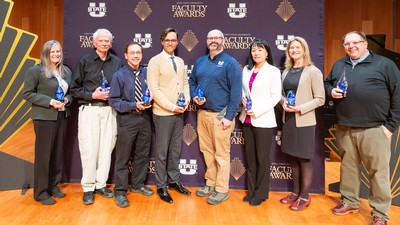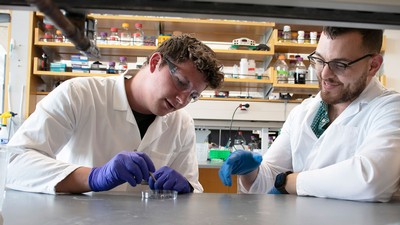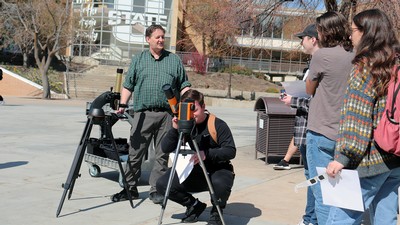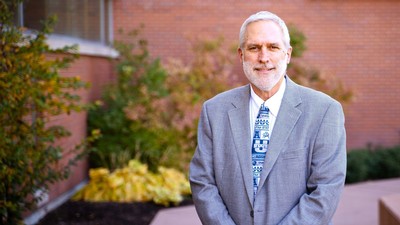Students Receive Grants to Conduct Impactful Undergraduate Research
By Riata Cummings |
Katherine Webb is strategically isolating specific microbes that inhabit the roots of plants to determine if there are microbes that can help the plants deal with salt stress.
Three students working in disciplines within the College of Agriculture and Applied Sciences were awarded Undergraduate Research and Creative Opportunity Grants (URCO) to support conducting their own research in life, plant and food sciences this summer.
Forage Plants with Greater Saline Tolerance: Maybe it’s the Microbes
Katherine Webb does plant health research with mentor Amita Kaundal, assistant professor of molecular biology/microbiology in the Department of Plants, Soils and Climate (PSC). Webb is strategically isolating specific microbes that inhabit the roots of plants to determine if there are microbes that can help the plants deal with salt stress.
“Climate change has increased soil salinity and decreased water availability across the world and led people in agriculture to using more saline sources of irrigation water,” Kaundal said. “This research may lead us closer to a solution for protecting our plants and crops against the stress caused by the higher saline levels.”
Webb is using the native plant Ceanothus velutinus, or snowbrush, to isolate different microbes, known as endophytes, and will test the isolated endophytes on corn and alfalfa plants with salt stress to determine which, if any, helped increase the stressed plants’ survival and yield.
In her proposal, Webb noted that to her knowledge no other studies have investigated the effects of salt-tolerant endophytes on plants of the Ceanothus genus and because alfalfa and maize are Utah’s most-grown forage crops, findings of her research may apply to helping farmers grow the crops more successfully on soils with high salinity levels.
Testing a New Measure of Fatty Acids
Aubreyona Migliori, is conducting food science research and is mentored by Bob Ward, an associate professor in the Department of Nutrition, Dietetics and Food Sciences. Migliori is testing a method she developed for measuring the free fatty acids and esterified, bonded fatty acids in a food fat.
The research stemmed from working with Ward in collaboration with Professor Silvana Martini, who was trying to determine if people can taste fat with their tongues. There is evidence that people can detect one fatty acid, linoleic acid, but only when it is free. However, vegetable oil, which was used for testing, is about 50% linoleic acid that is chemically bound. This made it difficult to test the exact fatty acid contents of the oil after subjects had tasted and spit it out.
Migliori developed a method to test both categories of fatty acids, and the method warrants comparison to the traditional titration method of measuring fatty acid contents’ of foods. Titration is simple to do, but it can only measure the total amount of free fatty acids and not contributions from specific fatty acids.
“Free fatty acids are considered a defect in food fats because they taste bad,” Ward said. “One place that measuring the free acid content of a fat is in olive oil. In order to be designated Extra Virgin, it must have a low acid content. We think Aubreyona’s method would be better suited to testing this than the traditional titration method.”
Developing a Human-COVID Protein-Protein Interactions Atlas
Student researcher Kolton Hauck is mentored by Rakesh Kaundal, assistant professor of bioinformatics in the PSC department, and investigates protein-protein interactions (PPIs) that are necessary for the SARS-CoV-2 virus to gain access to host cells, replicate and proliferate. Comparing and mapping the PPIs of emerging strains of the coronavirus will allow a better understanding of where the viruses are most dominant, what metabolic and cellular pathways the viruses are involved in, and what symptoms they may cause in a human host. As a result, drug developers would have clearer targets for precision medicines.
This research will also be important for predicting how viruses evolve and how effective vaccines can be against various strains. Because changes in the virus could render current vaccines ineffective, this research will help mitigate such an issue while aiding in the development of a pan-viral vaccine.
In his URCO grant proposal, Hauk described how the use of big-data analytics from his project will be central to developing an online tool that will be hosted on USU's Bioinformatics Facility servers to help other researchers visualize the PPIs of various SARS-CoV-2 strains and human proteins in real-time to guide their exploration of the effectiveness of treatments and potential vaccines.
URCO grants are funded by USU’s Office of Research to support worthy, independent, student-led projects. Faculty act as mentors, but students are responsible for designing their experiments, writing the grant proposal, constructing the budget, conducting the work and presenting their findings.
Katherine Webb (right) is investigating how specific microbes may aid plants deal with salt stress with mentor Amita Kaundal.
Aubreyona Migliori is testing a new method she developed for measuring fatty acids in foods in research mentor Bob Ward's lab.
Kolton Hauck is using big data to investigate how strains of the SARS-CoV-2 virus access host cells and replicate. He works with mentor Rakesh Kaundal in USU Bioinformatics Facility.
WRITER
Riata Cummings
Writer
College of Agriculture and Applied Sciences
riata.cummings@usu.edu
CONTACT
Amita Kaundal
Assistant Professor of Molecular Biology/Microbiology
Department of Plants, Soils and Climate
435-797-0457
amita.kaundal@usu.edu
Bob Ward
Associate Professor
Department of Nutrition, Dietetics and Food Sciences
435-797-2153
robert.ward@usu.edu
Rakesh Kaundal
Associate Professor and Director
Department of Plants, Soils and Climate/USU Bioinformatics Facility
rkaundal@usu.edu
Lynnette Harris
Marketing and Communications
College of Agriculture and Applied Sciences
435-764-6936
lynnette.harris@usu.edu
TOPICS
Grants 228stories Agriculture 225stories Biology 163stories COVID-19 157stories Undergraduate Research 157storiesComments and questions regarding this article may be directed to the contact person listed on this page.













